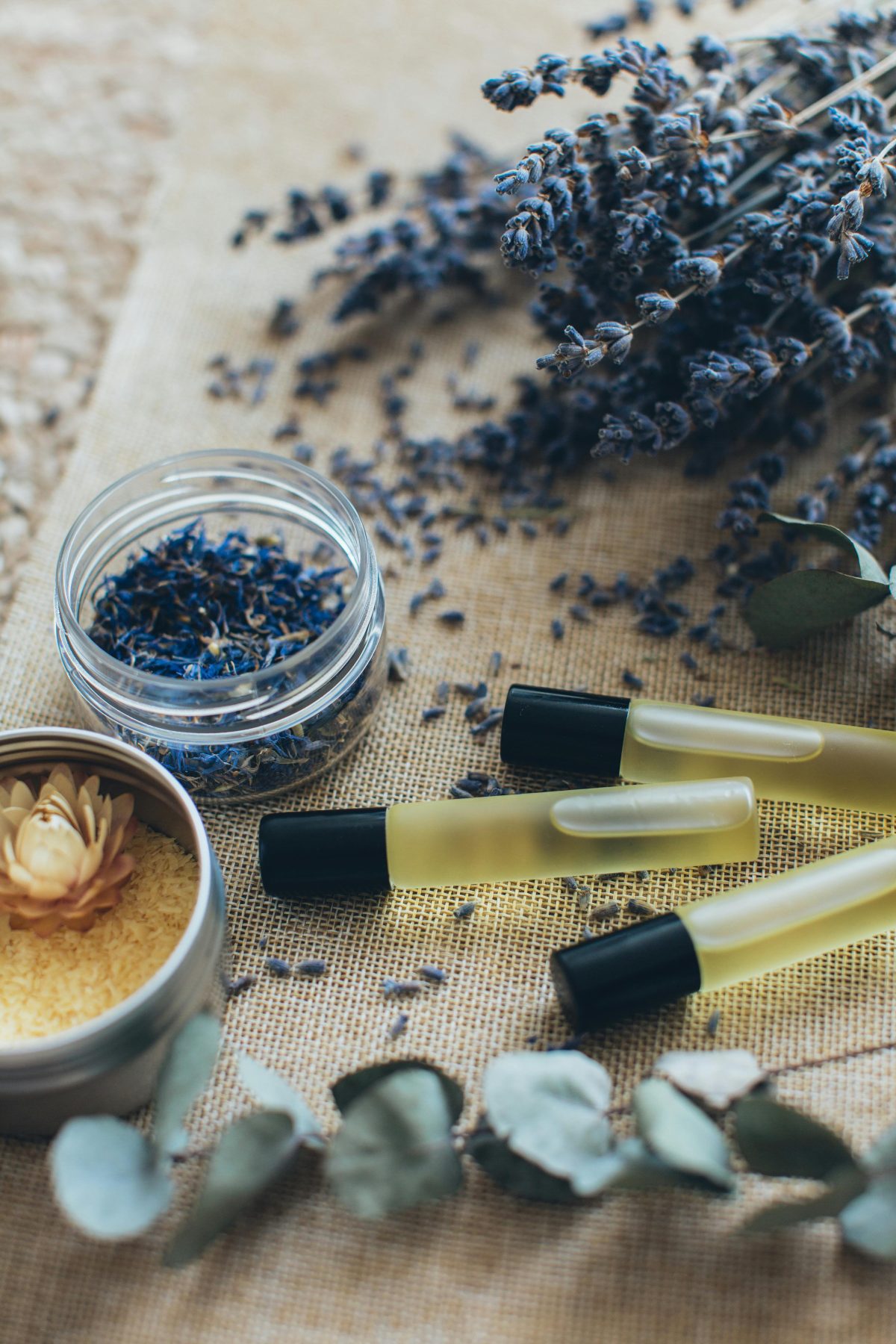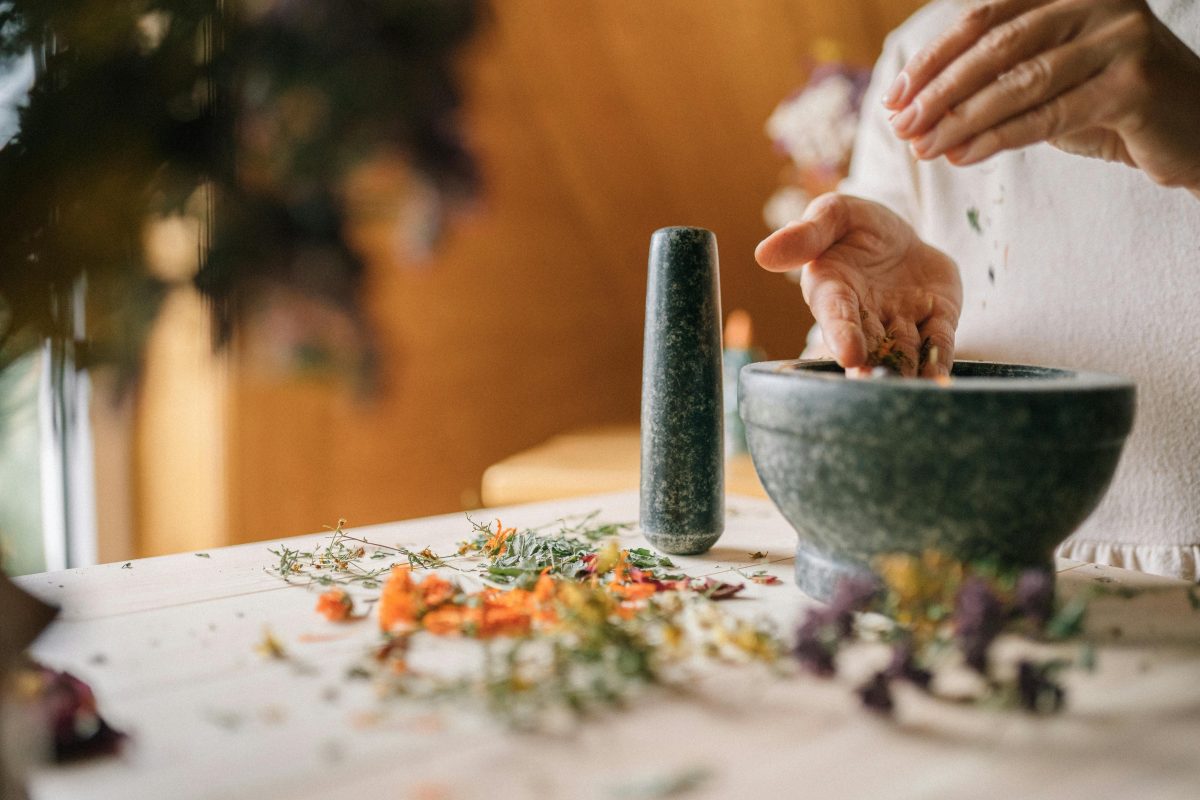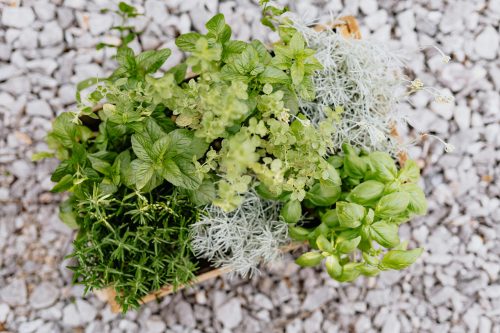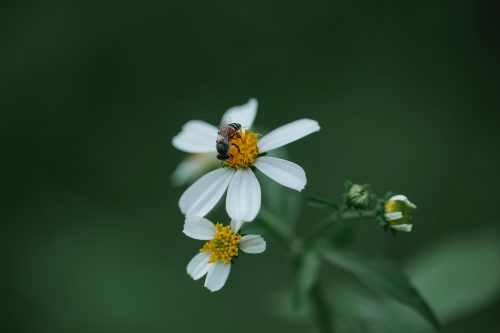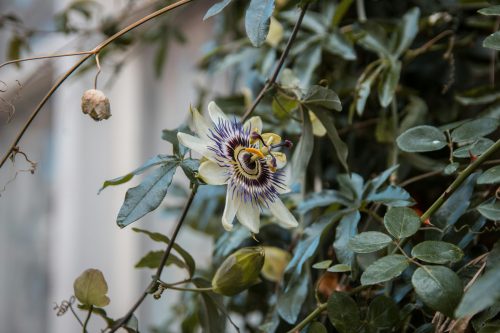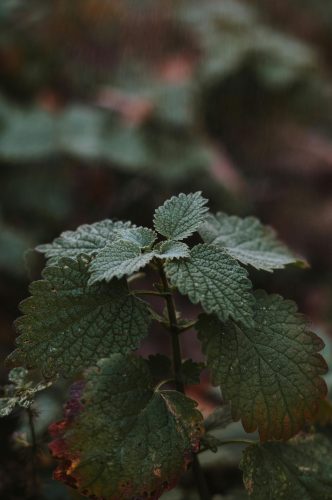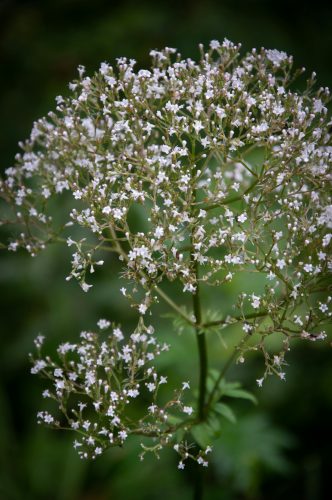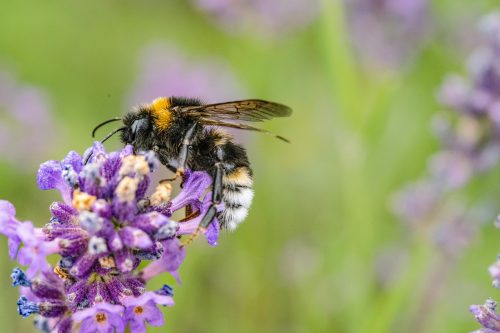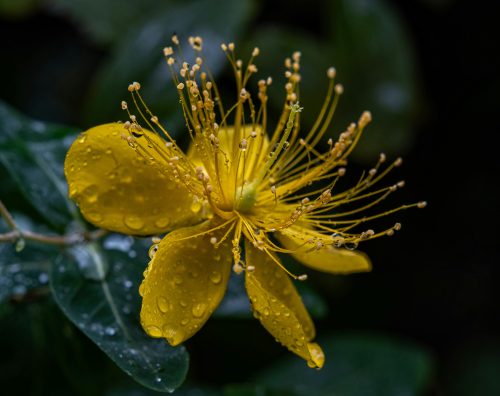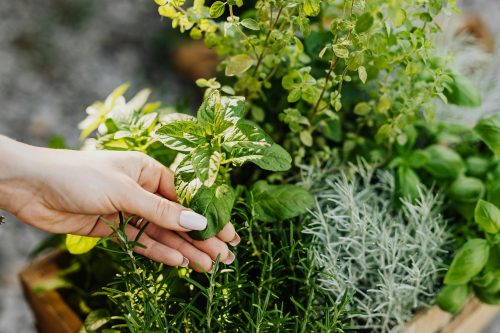More and more people are noticing the impact of modern life on their health and well-being as research starts to loom over their everyday choices. Me included. Our questions on how we can reconnect with our roots or return to a calm state through nature are mounting. And grounding herbs can be an answer to some of those questions.
It is no surprise that we are chasing ways to slow down and ground ourselves either in the moment, to ourselves, or to Mother Nature.
No surprise at all, when we find ourselves with scattered minds and running on autopilot to just keep up with the fast pace of life.
Even though we might sometimes feel robbed of the simplicities through growing consumerism, working harder for longer, and running to a finish line we fear we might never cross…
There are simple and short ways we can slow down, even for just a moment, and ground ourselves. In other words, reconnecting to ourselves or the world right now to achieve a calmer state of mind.
What Are Grounding Herbs?
We were born of this earth and its fruitful produce. As humans, we have used grounding herbs for thousands of years for remedies, ceremonies, rituals, medicine, food and more.
Central to cultures and traditions, knowledge around the foraging of herbs has been passed down through generations. Nowadays, herbs are used as complementary remedies alongside modern medicine.
It makes sense, then, that grounding herbs can help to support our connection to the earth, our minds, our bodies or just to life itself.
Grounding herbs are essentially plant parts, whether it be leaves or flowers or seeds, that can reconnect us to the here and now, to the earth, and to a more balanced state of being.
Which grounding herbs are best to use?
Different herbs work differently, or beautifully in conjunction. If you’re not sure which grounding herb is best for you, check out my blog on the 8 Best Grounding Herbs for Wellbeing.
Sharing is caring, and this knowledge I gained whilst working towards a qualification at a health and wellbeing store is no good kept to myself.
Cool, so you know what kind of herbs you might want to try and look out for. But how should we use them? In the blog I mentioned earlier, I focus mainly on supplements you can readily buy.
This blog is dedicated to looking at the versatile ways you can integrate grounding herbs into your lifestyle to feel connected to your roots.
Half of the benefits we reap from grounding herbs is not what we do with them, but how we do things with them
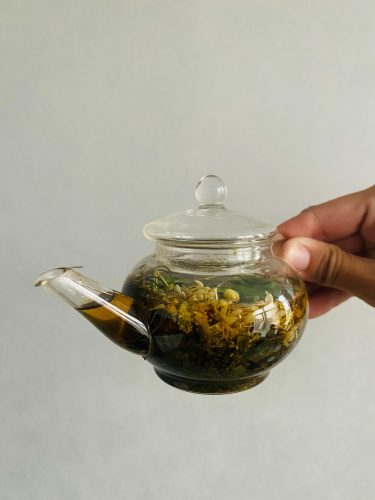
Direct Consumption of Grounding Herbs
Direct methods through food, drink or supplements will likely help you reap the most benefits as the most active ingredients would be absorbed.
This post contains some affiliate links from which I may earn a small commission at no extra cost to you. They are mainly from Amazon due to its’ convenience for busy people, like me. I am not paid to promote specific products, and only recommend products I genuinely use and love.
Herbal Teas
Drinking herbal tea infusions is my favourite way of integrating grounding herbs into my lifestyle. It has become an absolute staple in my nighttime routine to have a steaming pot of herbal tea to unwind.
This means I’m not just popping a supplement and getting on with life. I take a moment to sip, enjoy the flavour, feel the warmth of a cup and maybe reflect at the end of a long day, journal, or read my book whilst taking sips. I’ll repeat – half of the benefits we can reap from grounding herbs is not what we do with them, but how we do things with them.
If you are fortunate enough to have a garden, I highly recommend planting some lemon balm seeds. There is something therapeutic and grounding in itself to pick the leaves and steam some tea in the most organic, natural, local, and sustainable way possible (like my grandma does).
If time is not on your side or gardening isn’t your thing, you can get a bag of lemon balm leaves such as these to steam away in your teapot. My best investment this year has been this teapot with an infuser.
These are great first of all because it is possible to have loose-leaf tea (no thank you, plastic tea bags). Second, if you want to keep pausing your show and returning to the kettle to make another cuppa – so be it – but I completely underestimated how much time and effort I’d save with being able to have three cuppas in one with a teapot.
Otherwise, my high praises go to Twinings Sleep Mix Tea, which is now a staple in my cupboard. With a mix of four different teas, you can match flavour or grounding herb to your mood.
If I’m looking for grounding and sleepy relaxation, the ‚Sweet Dreams’ raspberry flavoured mix (valerian, passionflower, b-vitamins) is perfect on a summer’s day. When I feel I need a warm grounding hug at the end of a long day, the ‚Moment of Calm’ (Camomile, chicory root, cinnamon) mix delivers.
If I haven’t slept well, I might have the ‚Sleep Spiced Apple’ mix (Camomile, Passionflower, Spice Mix) or the ‚Sleep Orange Blossom’ mix (Camomile, Passionflower, Lavender & Valerian with Orange Flavouring).
If all these herbal names sound like gibberish to you, click here to find out exactly what they are and how they can help with grounding.
You can’t go wrong!
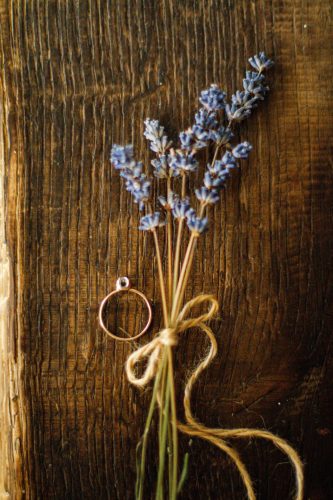
Cooking
Cooking with grounding herbs (or just herbs that support our overall well-being) is a beautiful way to absorb their active compounds through the digestive system.
Take holy basil, for example. It might not be a grounding herb in the traditional sense, like those used directly for relaxation or calm. But its’ properties have been linked to reduced inflammation.
And since inflammation has been connected to mood and mental health, supporting the body in this way can help us feel more grounded too.
Not only that, but you can practice grounding by trying to cook mindfully, slowly, and fully immersing yourself into the experience.
Recipe idea:
- Other ideas can be things like lavender honey. These can be stirred into herbal teas or used in recipes like lavender honey ice cream.
These little additions can add flavour and intention to your meals or snacks. A great way to ground yourself is pairing this with slow, mindful preparation.
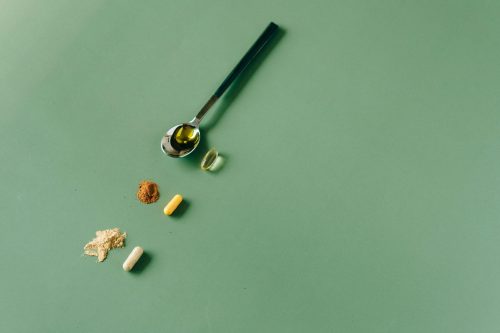
Supplements
With supplements, you get absorption of active ingredients through the stomach. Since many have concentrated ingredients (relative to teas ect), they are the most likely method to have the most impact on grounding. As always, if you’re on medication, please consult with a medical professional as some supplements have drug interactions. Here are the best types of grounding herbs to take in supplement form:
- Camomile
- Passionflower
- Lemon Balm
- Valerian
- Lavender
- Ashwagandha
- Skullcap
- St. John’s Wort (interacts with many medications)
If you want to know which to choose, refer to my blog on the 8 Best Grounding Herbs for Wellbeing.
However, i
In my opinion, supplements might be the most plain Jane and boring way of using herbs for grounding. What I will say is, integrating supplements into a morning or nighttime routine can only add to feeling grounded and present.
I’m a night owl, so my bedtime routine consists of sitting down with a grounding herbal tea and taking my supplements. I’ll do this alongside reading a book or watching my favourite show before doing a mindful meditation. Routine is the best way to build a habit and will help give you the best chance at feeling more grounded.
Indirect Consumption of Grounding Herbs
Grounding Herbal Baths
There’s something ancient and earthy about bathing in herbs. This method can absorb the herbal essences through your skin and is the perfect thing to integrate into a grounding routine.
In Vietnam, I had a herbal bath blend with lemongrass, ginger, and wild herbs after a 14 kilometre trek. I still remember how soothed my skin and nervous system felt after soaking in that herbal goodness.
You can try your own by tying dried herbs (like lavender, chamomile, or lemon balm). Just tie into a muslin cloth or reusable tea bag and soak it in the bath- or just leave them loose in the bath (they did this for me in Vietnam). If you’re lazy (like me), you can actually get premade botanical bath bags like this.
Alternatively, add a few drops of essential oil mixed with a carrier oil (like jojoba or almond oil) to the water.
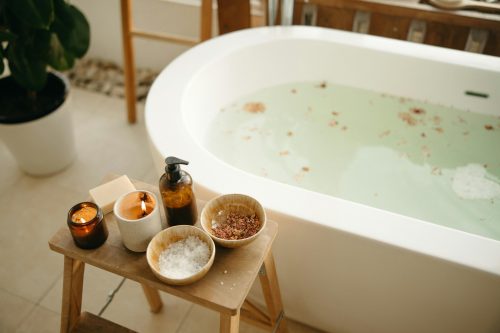
Essential oil diffusors
Infusing your air and space with grounding herbal oils like camomile and lavender is a less direct method of consumption. Still, it can change the atmosphere of a room to help you relax through scent.
Make sure to use high-quality essential oils. You can make blends of these yourself (using lavender, frankincense and vetiver) or buy pre-made blends.
I found one downside to these is that sometimes, especially if I’ve added a little too much essential oil, it can cause me to cough a little.
An alternative is reed diffusers. You can buy these premade, but if you want to get crafty, here’s the rundown on how to make your own. The benefit of this is that there are fewer chemicals involved, and you can craft your own herbal scent using a mix of different oils.
All links to the products needed are provided, so that you can be ready to go with one sweep!
If you have surplus glass and reed sticks, you can craft extra to make a super thoughtful gift.
1. Gather your supplies:
- Glass bottle: Choose a bottle with a narrow opening to help control the release of fragrance.
- Reed diffuser sticks: Rattan reeds are helpful for better fragrance diffusion.
- Carrier oil: As before, almond or jojoba oil are good choices.
- Essential oils: Select your favorite scents, keeping in mind that some essential oils are better for certain purposes (e.g., lavender for relaxation, citrus for uplifting).
- Alcohol (optional): A small amount of vodka or rubbing alcohol can help the oils travel up the reeds.
2. Prepare the mixture:
- Combine the carrier oil and essential oils in the bottle. You can use a ratio of 70% carrier oil to 30% essential oils.
- If using, add the alcohol to help with the diffusion process.
3. Insert the reeds:
- Place the reed sticks into the bottle, allowing them to absorb the oil mixture.
- Flip the reeds every so often (e.g., once a week) to refresh the scent.
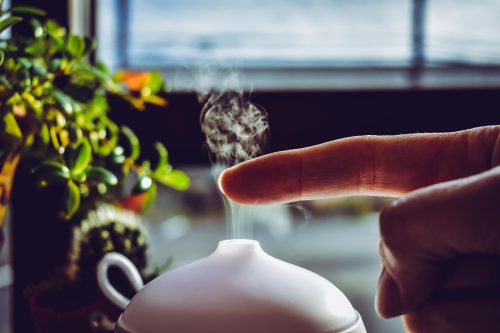
Natural Homemade Cleaning Products
A really satisfying and simple way to reduce exposure to synthetic chemicals is by making your own cleaning spray with grounding herb oils.
- 1 cup distilled white vinegar
- 1 cup filtered water
- 10–15 drops lavender essential oil
- 10 drops lemon or eucalyptus oil
- Optional: a few sprigs of rosemary or dried herbs in the bottle
You can mix this in a glass spray bottle and shake well before use. The vinegar cuts grease and bacteria, and the essential oils add a fresh, earthy aroma. You can use it on countertops, doorknobs, or even lightly mist linens (test fabric first). Similarly to diffusers, this simulates a calming environment after those weekend morning chores – adding extra satisfaction.
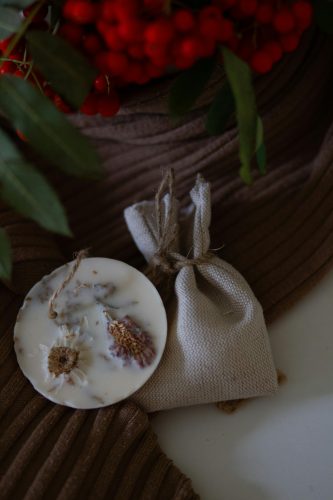
Herbal Sachets
These are a cute, subtle method to grounding with herbs. Fabric pouches filled with dried grounding herbs, including lavender, rosemary, or lemon balm.
You can buy empty sachets if you want to make your own, as pre-made ones are hard to come by. Tuck them into your wardrobe, drawers, or pillowcase for a subtle, grounding scent.
You can also keep one in your bag or desk drawer as a calming touchpoint when you’re feeling overwhelmed. Just give it a gentle squeeze and inhale.
After going through everything in this blog, you should be ready to start your grounding herb integration. Many products are interchangeable and can be used in different ways. The loose lavender for instance? You can use it for herbal baths, sachets and cooking. Let me know how you get on in the comments below!
